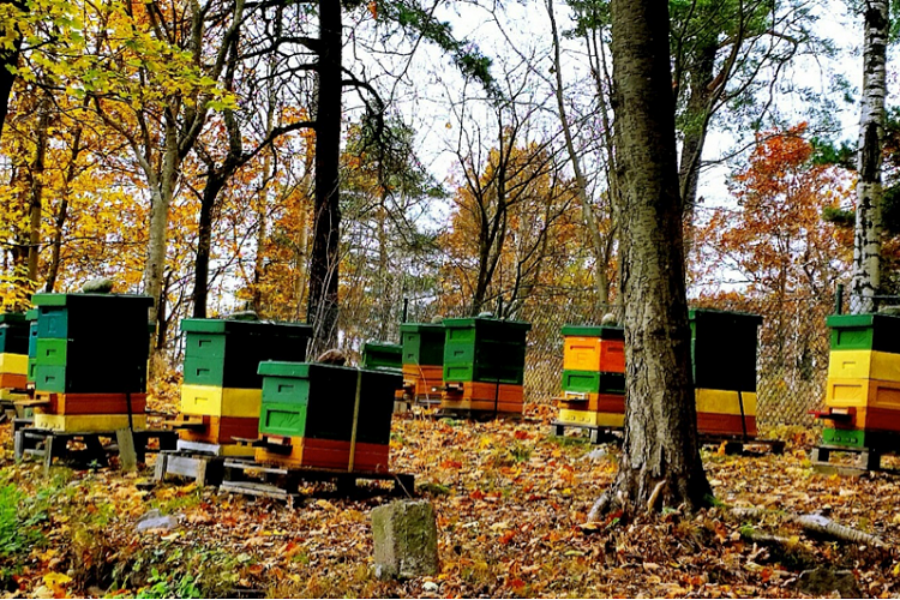In our recent interview with Daniela, a new beekeeper from Italy (check her out on Instagram @darlibees), we learned about her grandfather’s role in inspiring her to start beekeeping, why you shouldn’t be scared of bees and 3 important lessons she’s learned from the bees. Full interview below.




How long have you been a beekeeper? What inspired you to start beekeeping?
My grandfather (whose work colony I’ve watched over for years) inspired me. Four months ago, I decided to start a new colony of my own. I am actually waiting for spring to come so that I can take one queen and family to my home in Positano.
What was your greatest fear about starting to keep bees or the biggest barrier to entry?
No fears and barriers, a great passion moves me through this beautiful adventure.
Tell us three lessons that you’ve learnt from the bees.
1. Hard work always gives excellent results. 2. There is a time for everything in our lives – the bees have several assignments throughout their lives, similar to our life events. 3. Teamwork – bees are naturally much better at teamwork than humans.

How has working closely with bees changed your perception of nature or the world around us?
Since I’ve starting observing their movements and dances, I’ve become much more sensible to nature’s feelings.
What’s your favourite thing about being a beekeeper?
I feel honoured to be learning new things everyday from this amazing species and obviously to receive their precious gift.
Tell us about your most memorable experience with your bees in your first year.
When I opened up my hive for the first time, I was planning on taking close up photos and was expecting several stings, but they didn’t even try to sting me! I was amazed by their gentle and sweet behaviour.
What is the most difficult thing about being a beekeeper?
Seeing families get weak or die.

What surprised you the most in your first year as a beekeeper? What the most unexpected thing that happened with your bees?
A story from my grandfather, he always inspires me when he talks about the bees. It didn’t happen to me but it is about the colony where my family comes from. My grandpa used to keep the bees on land not far from the house. One day a neighbour started doing housework and the workers said to my grandpa that they didn’t want the bees to cause any problems. My grandpa knew that they weren’t going to create any problems for them, so he just left them there. One day he went to check on the bees and found that someone had tried to burn the apiaries. He was so sad and upset, he just pulled up each little house and carried them one by one on his back through the woods to reach his home. Bees were walking all over his face and body, but he didn’t get stung once – it was like they knew he was saving their lives.
What is you favourite bee product and why?
Honey. I love sweets and it is a multi purpose food.
What’s the weirdest thing you use a bee product for (eg. Carly likes to put honey on her face as a face mask)?
Honey for sore lips.
For those out there who fear the bees what words of advice do you have to clear up this misconception?
Bees are like all animals out there, they live their lives not bothering anyone. Obviously, if they get annoyed, they react. Also, honeybees are known for their sweet character.

What do you have to say to vegans who don’t believe in using bee products? We openly believe that supporting ethical and sustainable beekeepers is an important part of helping the bees and generating awareness, how do you respond to people who question the practices of taking and consuming bee products? What sustainable practices do you incorporate into your beekeeping?
Bees naturally overstock honey as you can observe in natural honeycombs in rocks or trees and don’t use it all. They make great reserves even if they don’t need it all ‘cos it’s their instinct. I try to not force my bees with breeding techniques, I place one honeycomb per nest, protect them from disease and leave them to do their natural flow.
Do you feel that people in your country are fairly conscious of the bees and their importance? We have many wonderful and passionate bee advocates but a large portion of the population is still unaware of all that the bees do for the earth. How is this looked at in your area or country? Do you find that there is a great need to cultivate awareness of the hard work of our buzzing friends?
I live in Italy and apiculture is very well developed. We have the Apis mellifera ligustica bee that is the Italian bee species. There are many beekeepers and farms that make organic bee products.

As a beekeeper, I’m sure that you’ve heard of Colony Collapse Disorder. In North America we have experienced serious issues with CCD over the last decade. How has CCD affected you?
No, I’ve never heard about it. It didn’t affect our bees.
Is there a neonicotinoid or other pesticide issue in your area? Is the government doing anything to reduce or ban the use of pesticides?
There are no pesticides in the area. The Italian government has banned some of them.
What bee related lesson or practice do you wish more people would adopt?
The perfect bees teamwork.
How are beekeepers viewed by your community? What do your friends think when you tell them that you’re a beekeeper?
People really appreciate beekeepers work and organic honey, but my friends think I’m crazy!
What is the one thing you want people locally to start doing to help the bees? Internationally? If you could share one message about the bees with the general public what would it be?
People should get more confident with the topic, enough to know how important bees are for the planet’s health. We still have so much to learn from animals and nature, technology is not going to save us if we don’t know how to sense nature’s signals.
What would you tell people to inspire them to act? What changes can we make in our lives to help the bees?
Actions come from small moves. Individual people can’t change the world, but individual choices can make a difference. We should be more sensible and appreciative of more natural processing of food and other products we use in our houses.





